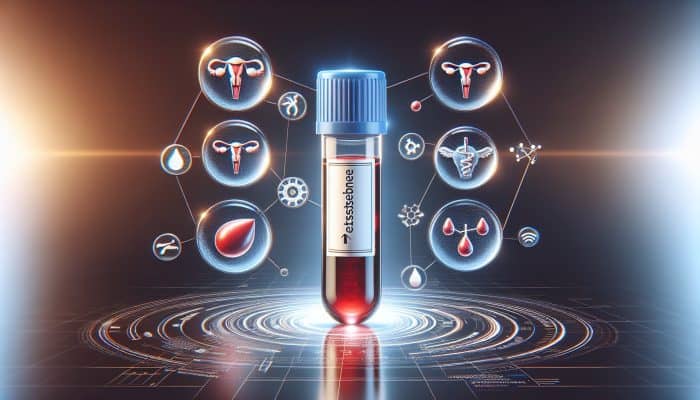Understanding the Importance of a Testosterone Blood Test for Your Overall Health
Explore the Key Measurements Offered by a Testosterone Blood Test

A testosterone blood test plays a crucial role in evaluating the levels of testosterone present in your bloodstream, providing essential insights into your hormonal health. Understanding your testosterone levels is vital for diagnosing various health issues, particularly in men. This significant test enables healthcare professionals to pinpoint conditions such as hypogonadism, infertility, adrenal gland disorders, unexplained fatigue, reduced libido, muscle weakness, bone density issues, and fluctuations in mood or cognitive function. By comprehending your testosterone levels, you can make enlightened health decisions, especially when experiencing symptoms that may suggest hormonal imbalances. This empowerment through knowledge encourages proactive measures to enhance your overall well-being.
Gain a Comprehensive Understanding of the Testosterone Blood Test Procedure
The testosterone blood test is a simple and efficient process involving the extraction of a small blood sample, typically collected from a vein in your arm. This quick procedure generally takes less than ten minutes to complete. A qualified healthcare professional will start by sterilising the area with antiseptic, applying a tourniquet to make the vein more prominent, and then inserting a needle to extract the blood sample. After the sample is obtained, a bandage is applied to minimise bleeding. Most individuals describe the experience as relatively painless, often finding the straightforward nature of the procedure pleasantly surprising and manageable.
Who Should Consider a Testosterone Blood Test and Why?
Men who display symptoms of low testosterone should actively consider undergoing this test, as it can yield critical insights into their health status. Symptoms to be vigilant for include chronic fatigue, decreased libido, impotence or erectile dysfunction, unexplained weight gain, loss of muscle mass, depression or mood swings, difficulty concentrating or memory issues, and reduced body hair or skin changes. If you identify any of these symptoms within yourself, it would be wise to consult with a healthcare provider about the necessity for a testosterone blood test, as early detection can significantly enhance the effectiveness of managing your health situation.
Identify the Best Timing for Your Testosterone Blood Test

It is advisable to schedule a testosterone blood test if you consistently experience symptoms indicative of low testosterone. Additionally, getting tested may be necessary if your healthcare provider recommends it for monitoring purposes or confirming a diagnosis. Regular testing is especially beneficial for men over the age of 40, as testosterone levels naturally decline with advancing age. By consistently monitoring your hormone levels, you can facilitate informed health management and early interventions when required, ultimately enhancing your health outcomes and overall well-being.
Explore Professional Insights on Testosterone Blood Testing Services Available in Heswall
Discover the Latest Innovations in Testosterone Testing Methods
Recent advancements in testosterone testing have significantly improved both the accuracy and convenience of diagnosing hormonal imbalances. More sensitive assays have empowered healthcare professionals in Heswall to obtain precise measurements of testosterone levels, which are essential for understanding an individual’s unique hormonal profile. Moreover, the introduction of home testing kits allows individuals to perform tests within the comfort of their own homes. These kits are particularly beneficial for those who may find it challenging to visit a clinic in person. Local pharmacies and health shops in Heswall have begun to offer these testing kits, thereby enhancing accessibility for the community. The integration of technology into healthcare has streamlined the testing process, providing patients with more control and simplifying the monitoring of testosterone levels.
Understand the Approach Taken by Local Clinics in Heswall for Testosterone Testing

Clinics in Heswall are enhancing their offerings concerning testosterone testing, providing comprehensive services that extend well beyond mere blood tests. Many local clinics also offer follow-up consultations to discuss the results, making it easier for patients to understand their health situations. When choosing the right clinic, it is essential to consider factors such as the qualifications of healthcare professionals, the availability of additional services, and patient reviews. Taking actionable steps, such as reviewing the clinic’s website for detailed service information, making inquiries about specific testing protocols, and seeking recommendations from friends or family who have undergone similar tests can help ensure you make an informed choice.
Expert Recommendations for Interpreting Testosterone Test Results
Interpreting the results of a testosterone blood test requires a nuanced and comprehensive approach. Experts recommend considering a variety of factors, including age, overall health history, and specific symptoms experienced by the patient. In Heswall, healthcare providers routinely engage in detailed discussions with patients post-testing to clarify the significance of their results. It’s crucial to remember that testosterone levels can vary significantly from one individual to another. Therefore, reflecting on personal health conditions and lifestyle choices becomes essential when analysing results. If your levels are found to be outside the normal range, a thorough evaluation of potential underlying causes will be necessary to determine the most appropriate treatment path.
Understanding the Benefits of Undergoing a Testosterone Blood Test
Transform Your Health Management Through Testosterone Testing
Understanding your testosterone levels can profoundly impact your health management strategy. For men diagnosed with hypogonadism, awareness of these levels enables the creation of tailored treatment plans that can greatly improve their quality of life. Conditions such as fatigue and reduced libido can often be effectively managed once the underlying hormonal imbalance is identified and addressed. Furthermore, regular testing can facilitate the early detection of potential health issues, allowing for timely interventions. This proactive approach to health can foster a more robust overall well-being and longevity, empowering individuals to lead healthier and more fulfilling lives.
The Psychological Benefits Associated with Normal Testosterone Levels
Maintaining normal testosterone levels extends beyond physical health; it has a significant impact on psychological well-being as well. Research indicates that balanced testosterone levels can enhance mood and cognitive function, thereby reducing the risk of depression and anxiety. Many residents in Heswall have reported improved mental clarity and emotional stability after receiving appropriate management for their testosterone levels. The connection between hormonal levels and mental health can motivate proactive testing and treatment, fostering a holistic health approach that encompasses both physical and psychological dimensions.
Enhancing Athletic Performance Through Optimal Testosterone Levels
Achieving optimal testosterone levels is frequently linked to improved athletic performance, making testosterone testing particularly relevant for athletes. Testosterone plays a critical role in muscle mass development and energy maintenance, both of which are essential for enhanced performance in sports. In Heswall, local athletes have increasingly recognised the importance of monitoring their testosterone levels as an integral component of their training regimen. Understanding personal testosterone levels can assist in tailoring training programmes, ultimately resulting in increased strength, endurance, and success in athletic pursuits.
Essential Preparation Steps for Your Testosterone Blood Test
What Key Actions Should You Take Before Undergoing the Testosterone Test?
Proper preparation for a testosterone blood test is crucial to ensure accurate results. Depending on your healthcare provider’s instructions, fasting may be required, and certain medications should be avoided prior to testing. Pre-test preparations may involve:
- Avoiding food intake for 8-12 hours before the test
- Consulting with your healthcare provider regarding any medications you are currently taking
- Refraining from strenuous exercise for 24 hours prior to the test
- Avoiding alcohol and recreational drugs for at least 24 hours
Following these guidelines will help ensure the integrity of your test results, providing a clearer and more accurate picture of your hormonal health.
Choosing the Optimal Timing for Your Testosterone Testing
Timing plays a significant role in the results of a testosterone blood test, as testosterone levels naturally fluctuate throughout the day. Experts typically recommend scheduling tests in the morning when testosterone levels usually peak. In Heswall, many clinics offer morning appointments specifically for this reason. By selecting the appropriate time for testing, you can enhance the likelihood of obtaining accurate and representative results, which are essential for the effective diagnosis and treatment of potential issues.
Your Experience During the Testosterone Blood Test Procedure
The testosterone blood test is a quick and efficient procedure that typically takes less than ten minutes to complete. Patients usually experience minimal discomfort during the blood draw. Expect to sit comfortably while a healthcare professional cleans the area, applies a tourniquet, and draws blood from your arm. Most individuals find the experience manageable, and the procedure is generally well-tolerated. After the blood sample is collected, a bandage will be applied to minimise any bleeding, allowing you to swiftly return to your daily activities.
Deciphering Your Testosterone Test Results Effectively
Understanding your testosterone levels is vital for making informed health decisions. Normal testosterone ranges can vary based on age, and results should always be discussed with a healthcare provider for accuracy. In Heswall, many healthcare professionals emphasise the importance of a comprehensive evaluation, which considers personal health history and symptoms when interpreting results. If your testosterone levels are found to be outside the normal range, further testing or treatment options may be necessary to address underlying issues effectively. Engaging in an in-depth dialogue with your healthcare provider will lead to better health outcomes and personalised management plans.
Potential Risks to Consider Before Undergoing the Test
The testosterone blood test is generally safe; however, like any medical procedure, it comes with certain risks. The most common risks include minor bruising or infection at the needle site. In rare instances, some individuals may experience fainting or dizziness due to anxiety or discomfort. It is essential to discuss any concerns with your doctor prior to the test to alleviate any fears you may have. Overall, the benefits of accurate testing far outweigh the minimal risks involved, making it a valuable tool for assessing your hormonal health.
Comprehending Your Testosterone Levels for Enhanced Health
What Normal Testosterone Levels Should You Aim For?
Normal testosterone levels can vary based on age and individual health factors. Nevertheless, levels ranging from 300 to 1,000 ng/dL are typically regarded as normal for adult males. Understanding where you stand within this range can assist you and your healthcare provider in making informed health decisions. In Heswall, clinicians often adopt a personalised approach to evaluating these levels, considering lifestyle factors, symptoms, and overall health when assessing testosterone levels. Regular monitoring can provide valuable insights into your hormonal health over time, enabling timely interventions if necessary.
The Impact of Age and Lifestyle Choices on Testosterone Levels
Age and lifestyle factors, including diet and exercise, can significantly influence testosterone levels. As men age, testosterone levels naturally decline, leading to various health challenges. Additionally, lifestyle choices—such as levels of physical activity, dietary habits, and effective stress management—play a pivotal role in maintaining optimal testosterone levels. In Heswall, many healthcare providers advocate for a healthy lifestyle that incorporates regular exercise and balanced nutrition to support hormonal health. By acknowledging these influences, individuals can take proactive steps to effectively manage their testosterone levels and enhance their overall well-being.
Steps to Take If Your Testosterone Levels Are Abnormal
If your testosterone levels are found to be abnormal, further testing or treatment may be required depending on the underlying cause. Low levels could indicate conditions such as hypogonadism, while high levels may suggest other health complications. In Heswall, healthcare providers typically conduct a comprehensive assessment to identify potential causes before recommending treatment options. This could include lifestyle changes, medication, or hormone replacement therapy. Being proactive about your health and seeking follow-up consultations can lead to effective management of any abnormalities, ensuring that you maintain optimal hormonal balance.
Methods for Effectively Testing Your Testosterone Levels
Testing your testosterone levels usually involves blood tests, which are most accurate when conducted in the morning due to higher testosterone levels at that time. In some instances, multiple samples may be required to ensure accuracy and reliability. In Heswall, local clinics provide convenient testing options, simplifying the process for patients managing their hormonal health. Regular testing is crucial for monitoring changes over time, particularly for those experiencing symptoms of hormonal imbalance or those undergoing treatment for testosterone-related conditions. This consistent approach ensures that you remain informed about your health status.
Research-Backed Benefits of Testosterone Blood Testing in Heswall
Insights from Studies on Testosterone Testing
Research consistently demonstrates that regular testosterone testing can lead to improved management of testosterone-related conditions. Studies indicate that men who engage in regular monitoring tend to experience enhanced health outcomes, as they can make informed decisions regarding their treatment. In Heswall, local clinics have begun to integrate these findings into their practice, advocating for annual testing for men over 40 or those displaying symptoms. By aligning testing practices with contemporary research, healthcare providers enhance their capacity to effectively support patients, ensuring they receive appropriate care.
The Long-Term Health Outcomes of Regular Testing
Long-term monitoring of testosterone levels can prevent complications and enhance overall quality of life. By identifying and addressing hormonal imbalances early, individuals can mitigate the risks associated with untreated conditions. In Heswall, many healthcare providers underscore the importance of ongoing management, particularly for older men or those experiencing symptoms of low testosterone. Actionable steps for maintaining long-term health include regular check-ups, lifestyle modifications, and open communication with healthcare professionals regarding any changes in health status. This proactive mindset can lead to significant improvements in overall health and well-being.
Expert Recommendations on the Frequency of Testosterone Testing
Experts typically recommend annual testosterone testing for men over the age of 40 or those exhibiting symptoms of hormonal imbalance. In Heswall, healthcare professionals often tailor the frequency of testing based on individual health profiles and associated risks. Regular discussions with your healthcare provider about your testing schedule can help ensure that you remain aware of any significant changes in your testosterone levels. This proactive strategy allows for timely interventions and sustained health improvements, ultimately enhancing your overall quality of life.
The Positive Impact of Testosterone Testing on Mental Health
Testosterone testing can be instrumental in identifying hormonal imbalances that may adversely affect mood and cognitive function. Many individuals in Heswall have reported improvements in mental health following treatment for low testosterone levels. By recognising the intricate connection between hormones and mental health, patients can take proactive steps to address underlying issues. Regular monitoring and adjustments to treatment can lead to enhanced emotional well-being, reduced anxiety levels, and improved cognitive function—making testosterone testing a vital component of holistic health management.
Where to Access Comprehensive Testosterone Blood Testing Services in Heswall
Identifying Reliable Clinics Offering Testosterone Testing Services
Numerous clinics in Heswall provide testosterone blood testing services, each differing in expertise and service offerings. Local healthcare facilities commonly employ qualified professionals who can guide patients through the testing process and provide thorough consultation services. Researching the clinics available in your area can help you select one that best aligns with your needs. Look for facilities with positive patient reviews, experienced healthcare providers, and a commitment to personalised care to ensure a high-quality testing experience tailored to your health requirements.
Understanding the Costs and Insurance Coverage for Testing Services
The costs associated with testosterone blood tests can vary significantly among clinics, with some offering packages that include consultations and follow-up care. On average, patients can expect to pay between £50 and £150 for the test, depending on the clinic and the services provided. Insurance coverage also varies; some plans may cover the cost entirely, while others might require out-of-pocket expenses. It is essential to check with your insurance provider and the chosen clinic beforehand to understand any potential costs involved, ensuring you are well-informed before proceeding with the testing.
Scheduling an Appointment for Your Testosterone Blood Test
Booking an appointment for a testosterone blood test can typically be done online or via phone, with most clinics in Heswall offering flexible scheduling options to accommodate patients. When making your appointment, be sure to ask about the specific requirements for the test and whether any pre-test preparations are necessary. Many clinics also allow for walk-in appointments, but calling ahead can ensure that you receive prompt service and tailored guidance for your health needs, making the entire process smoother and more efficient.
Addressing Common Queries Regarding Testosterone Blood Testing
What is the primary purpose of a testosterone blood test?
A testosterone blood test primarily measures testosterone levels, assisting in diagnosing conditions like hypogonadism and monitoring overall hormonal health.
How often should I have my testosterone levels checked?
Experts recommend annual testing for men over 40 or those exhibiting symptoms of low testosterone to ensure proper health management and timely intervention.
Are there any risks associated with the testosterone blood test?
While risks are minimal, they can include minor bruising or infection at the needle site. It’s crucial to discuss any concerns with your healthcare provider prior to the test.
Is fasting necessary before the testosterone blood test?
Fasting may be required based on your healthcare provider’s instructions. It’s advisable to confirm with the clinic before your appointment to ensure accurate results.
What are considered normal testosterone levels for men?
Normal testosterone levels generally range from 300 to 1,000 ng/dL for adult males, although these values can vary depending on age and individual health factors.
What steps should I take to prepare for my testosterone blood test?
Preparation may involve avoiding food for 8-12 hours, consulting about medications, and refraining from strenuous exercise before the test to ensure accurate results.
Can low testosterone levels impact mood and mental health?
Yes, low testosterone levels can significantly affect mood and cognitive function, potentially leading to symptoms of depression and anxiety, making monitoring essential.
How long does the testosterone blood test procedure take?
The procedure typically takes less than ten minutes, making it a quick and efficient method for assessing hormonal health and addressing potential issues.
What should I do if my testosterone levels are found to be abnormal?
If your testosterone levels are abnormal, consult your healthcare provider for further testing and appropriate treatment options tailored to your unique situation.
Are home testing kits for testosterone reliable?
Home testing kits offer a convenient option for initial assessments; however, it is best to confirm results through a professional blood test for greater accuracy.
Connect with us on Facebook!
This Article Was First Found On https://bloodtest.co.uk
The Article Testosterone Blood Test Guide for Heswall Residents Was Found On https://limitsofstrategy.com

